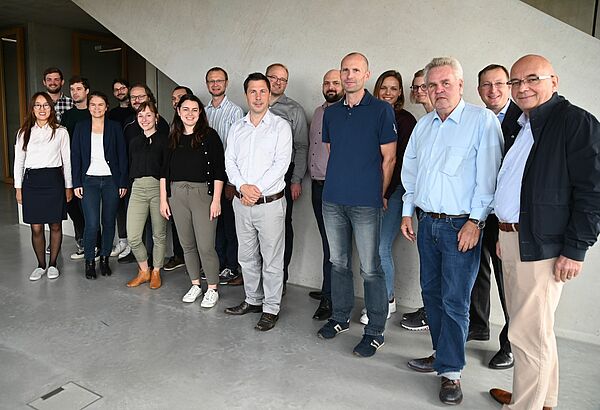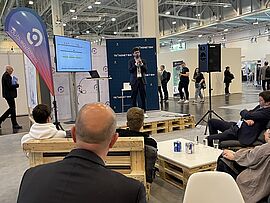Grid Service Market Symposium 2024
01.-02. July 2024 │Lucerne
3rd DigIplat project workshop
04.-05. Oktober 2023 │Ulm
New Innovative Approaches towards the Integration of Distributed Flexibility Options
Technische Hochschule Ulm (THU), Transnet BW, Austrian Power Grid AG (APG), Austrian Institute of Technology (AIT), Fichtner IT Consulting, Karlsruher Institut für Technologie (KIT), Universität St. Gallen met to the 3rd DigIplat project workshop in Ulm, Germany and developed new innovative approaches towards the Integration of Distributed Flexibility Options:
⚡ A protype of a framework for interoperable flexibility platforms for the use in balancing markets including the platforms equigy and da/re was presented
⚡A new method for stepwise linear approximation of distribution grid models for the use in a congestion limiter in distribution grids was intensively discussed and developed further
⚡ The next phases of the project were planned, different work packages reviewed and the meeting was concluded with good synergies.
Improving Flexibility Procurement: Option for Product Standardisation
18th IAEE European Conference│July 2023 │Milano
The current European landscape of flexibility services is versatile. Services for balancing, congestion management (CM) and intraday (ID) markets differ based on their degree of harmonization, the technical challenge they are meant to solve, the need owner and their specific product characteristics. As the number of flexible technologies and their availability at different network levels are evolving, so do – to an extent – the attributes of flexibility products and the requirements to flexibility service providers (FSPs). Overall, however, country implementation and product requirements remain largely heterogeneous.
To enable interoperability of flexibility use for different services, in the course of the project DigIPlat1, we identify flexibility attributes and analyze ways in which heterogenous flexibility products could potentially be standardized. The standardization of requirements for flexibility products is aimed at enabling a more efficient use of flexibility for multiple use cases, balancing and CM but also the ID market promising an increase in market liquidity and – in the best case – lower overall system costs. The goal of increasing liquidity in the flexibility market(s) must be balanced against the difficulties of meeting more specific system needs, accounting for technology-specific attributes and implementation efforts. We show that product standardization in fact represents a scale, on which the trade-offs between liquidity, system efficiency, ease of participation and implementation effort characterize potential solutions. We further show that product standardization should be analyzed on two complementing levels, 1) international in the sense of product-wise standardization and 2) national in the sense of cross-product integration. Regarding the second, we argue that there is still a lot of untapped potential for increasing the efficiency of flexibility procurement and identify the main issues that need to be addressed, such as the use of locational information for multiple services or harmonization of pricing rules.
Die Bedeutung von Plattformen für zukünftige Flexibilitätsprodukte: Potentiale und Perspektiven
E-World │2023 23.-25. May 2023 │Essen
Vom 23. bis zum 25. Mai 2023 präsentiert die TransnetBW auf der E-world energy & water in Essen auf dem Gemeinschaftsstand des Prototype.clubs mit einer Fülle an Themen und gibt Einblicke in innovative Projekte rund um das Stromnetz der Zukunft.
Neue Wertschöpfung durch Handel mit flexiblen Kapazitäten
15. September 2022 │St.Gallen
Bisher ist der Zugang zu den Märkten für Systemdienstleistungen nur grossen Stromversorgern vorbehalten. Mit zunehmenden dezentralen Einspeisungen und Speicherkapazitäten auf Verteilnetzebene wächst der Bedarf an Stabilisierungsmechanismen über alle Spannungsebenen und damit auch an der Einbindung aller Versorger und Verbraucher. Dezentrale flexible Erzeugungs- und Speicherkapazitäten sowie die Umwandlung in weitere Energieträger wie Wasserstoff, synthetische Gase oder Wärme erfordern eine effiziente und effektive Abstimmung. Handelsplattformen für flexible Kapazitäten helfen mit der Stabilisierung des Stromnetzes die Versorgungssicherheit zu gewährleisten, die Volatilität der stochastischen Einspeisungen zu monetarisieren und damit Mehrwert zu generieren.



